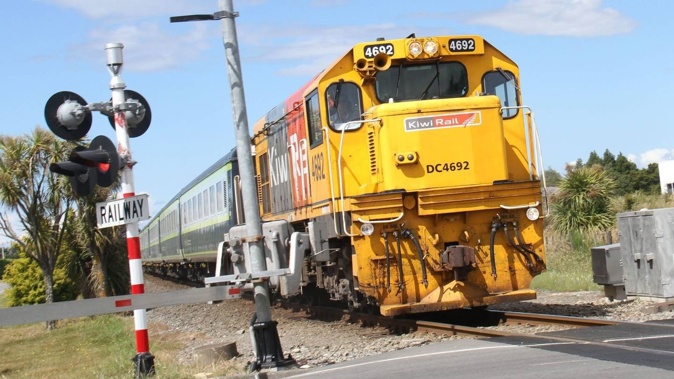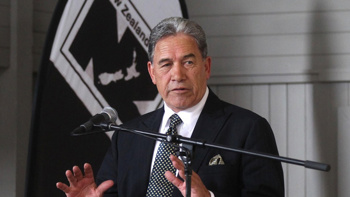
Brand-new train tracks signed off by KiwiRail just two months ago are already in need of a fix after it was discovered they had been built too narrow for the carriages that use them, meaning months of delays ahead for commuters.
The Greater Wellington Regional Council has confirmed the tracks, covering approximately 16km near South Featherston in Wairarapa, were laid 4mm narrower on average than they should have been.
The problem is causing train services to vibrate and is said to be causing “wear and tear” on the train carriages themselves - forcing speeds to be reduced from 100km/h to 60km/h.
The new track was laid and certified by KiwiRail in December.
KiwiRail metros general manager Jon Knight said they understand how frustrated people will be with the ongoing delays due to the error.
It’s estimated the speed restriction causes each service to be delayed by at least six minutes.
Knight said KiwiRail has been working extremely hard over the past few years, “replacing old track so the people of Wairarapa can have improved train services”.
KiwiRail is currently “finalising the best approach” to tackle the issue. However, Knight warns that grinding down the rail to improve the interface is currently not an option due to the potential fire risk.
It’s not certain when fire restrictions will ease enough to allow speciality machinery to be used to remedy the problem.
Meanwhile, reprofiling carriage wheels on the train would reportedly take up to 18 months.
- Agencies behind Auckland train cancellations to get "bloody good bollocking" from Wayne Brown
- Commuters warned to expect more delays as Wayne Brown grills rail bosses
- Auckland's mayor pushing for 'sensible solution' to city's train troubles
Greater Wellington Regional Council said passengers would be “disappointed” to learn about the new issues with the Wairarapa line.
Chairman Daran Ponter said his “eyes popped out of his head” when he heard the news.
He noted the speed restrictions would be in place for quite some time. “I’m talking a number of months, rather than a few days or weeks,” Ponter told NZME.
Ponter said the Regional Council is in “urgent discussions” with KiwiRail and Transdev to fix the matter.
“Wairarapa passengers are fed up with their second-class status.”
Wellington trains facing more heat delays
/cloudfront-ap-southeast-2.images.arcpublishing.com/nzme/SZDO63WQO5A6NIQD54AD3VAWTY.jpg) Commuters boarding a Metlink train at Paremata Station, Porirua. Photo / Mark Mitchell
Commuters boarding a Metlink train at Paremata Station, Porirua. Photo / Mark Mitchell
For Wellington, it’s the warmer weather putting increasing pressure on regional train services, with commuters being warned to accept heat restrictions as the new “reality”.
When a train line’s temperature reaches above 40C, a 40km/h speed restriction is imposed on trains to prevent the track from warping.
Data from KiwiRail, released to NZME under the Official Information Act, shows there have already been more Wellington train services delayed due to heat restrictions in the first month of 2024, compared to all of last year.
In January this year, there were 27 hours’ worth of delays on days with heat restrictions. That compares to 26.5 hours for all of 2023.
Heat restrictions were also a major problem in Auckland last week prompting widespread train cancellations and delays for commuters.
KiwiRail said heat restrictions are a “common occurrence” over summer. As the steel tracks heat up, they expand, which can cause tracks to misalign and potentially damage rail-side equipment.
The state-owned enterprise confirmed there are “no plans” to reduce the impact of heat-related restrictions on trains in the current financial year due to funding constraints. It states it continues to maintain a safe and compliant network regardless of the apparent issue.
Ponter told NZME that heat restrictions are “the reality”.
“It’s something that we live with in terms of the way that our rail network is constructed. I doubt whether KiwiRail has any easy fix for this.”
Auckland University transportation expert Dr Timothy Welch previously told the Herald the density of the railway tracks absorbed sunlight, forcing delays even on days when the air temperature doesn’t seem excessive.
Across the ditch
KiwiRail suggests it is “common practice” for tracks to be under heat-related restrictions overseas. In a document attached to NZME’s Official Information Act request, KiwiRail said “Melbourne Metropolitan network has a blanket restriction at a rail temp of 42 degrees”.
In New Zealand, trains under heat restrictions are slowed from 100km/h to 40km/h, when track temperatures reach 40C.
Heat-related speed restrictions for Melbourne’s Metro Train network are much less significant than those in New Zealand.
In Melbourne, when track temperatures reach 55C, speed is restricted to 80km/h, down from 110km/h.
KiwiRail’s suggestion Melbourne’s Metropolitan network has a blanket restriction at 42C relates to the ambient temperature, not the rail temperature.
Ponter suggested there may be ways to better anticipate heat restrictions with the weather forecast, but ultimately believed it was “something people had to put up with”.
Azaria Howell is a Wellington-based multimedia reporter with an eye across the region. She joined NZME in 2022 and has a keen interest in city council decisions, social housing and transport.
Take your Radio, Podcasts and Music with you









